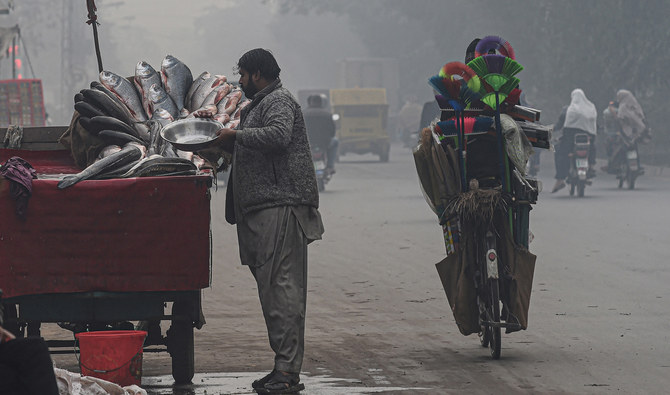KARACHI: Economists in Pakistan on Tuesday warned of greater inflationary pressure while responding to the government’s decision to present a supplementary budget to meet the International Monetary Fund’s conditions for the resumption of a $6 billion loan program.
The IMF and Pakistan reached a staff level agreement last month on the policies and reforms required to complete the sixth review under the bailout program which will provide the country access to about $1 billion in the coming weeks.
However, the agreement still requires the endorsement of the Fund’s executive board after the implementation of various fiscal and institutional reforms.
Pakistan’s finance chief Shaukat Tarin told a media briefing after the conclusion of the IMF talks that the Fund wanted the country to implement five conditions, including “the withdrawal of tax exemptions and autonomy of central bank.”
“Amid higher interest rate, huge disparity between dollar and rupee exchange rates and higher import bill, the implementation of IMF conditions is likely to deal a blow to Pakistan’s economy,” Dr. Ashfaque Hasan Khan, senior economist and member of the government’s Benazir Income Support Program (BISP), told Arab News while pointing out it would lead to greater inflationary pressure.
The spokesperson of Pakistan’s finance ministry, Muzzammil Aslam, reiterated that the government wanted to reform sales tax without putting extra burden on taxpayers.
“There will be sales tax withdrawal and no new tax is going to be levied,” he told Arab news. “The quantum of the withdrawal is Rs350 billion.”
He informed the supplementary budget would soon be presented to the cabinet before being taken to parliament. “This will be done before the IMF executive board meeting which is expected to take place next month (January).”
However, economists maintained the implementation of IMF conditions would have an overall impact of Rs600 billion including Rs350 billion in the withdrawal of tax exemption.
“The impact of exemption, withdrawal and other measures to collect additional revenue would be Rs600 billion in monetary terms which will be passed on to consumers,” Dr. Farrukh Saleem, a senior economist who previously served as the government’s spokesperson, told Arab News.
“These measures will have to be implemented through a mini budget or finance bill that will be presented in parliament and have political connotations,” he said, adding: “These measures will bring about a flood of inflation.”
However, Aslam downplayed the concern, saying items used to measure the Consumer Price Index (CPI) would not be affected.
“Tax exemptions will mostly be withdrawal from items which are not part of the CPI basket,” he said. “There will be no direct impact on consumers.”
However, the Pakistani authorities maintained they would also increase tax on petroleum products to meet another IMF demand. The country’s finance chief said last month the petroleum development levy would be increased by Rs4 per month to Rs 30.
“This will put additional burden of Rs80 billion on consumers this month and will go up to Rs320 billion,” Saleem said. “The government has also increased power tariffs.”
Inflation in Pakistan soared to 11.5 percent on a year-on-year basis in November 2021 as compared to 9.2 percent in the previous month and 8.3 percent in November 2020.
Pakistan’s trade deficit between July and November also posted a growth of 112 percent, as it reached $20.6 billion. The import bill for November 2021 increased by $7.8 billion, according to the Pakistan Bureau of Statistics (PBS).
The high import has exerted pressure on the country’s national currency which closed at an all-time high at Rs176.79 against the US dollar on Tuesday.
Pakistani experts said the country should stop importing luxury items, including cars and pet food.
“I have been persistently calling for curtailing imports of non-essential items, including luxury cars, mobile phones, fruits from western countries, and food for dogs and cats,” Dr. Hassan said, adding: “A committee must be formed to take speedy decision on the items to be imported.”




















